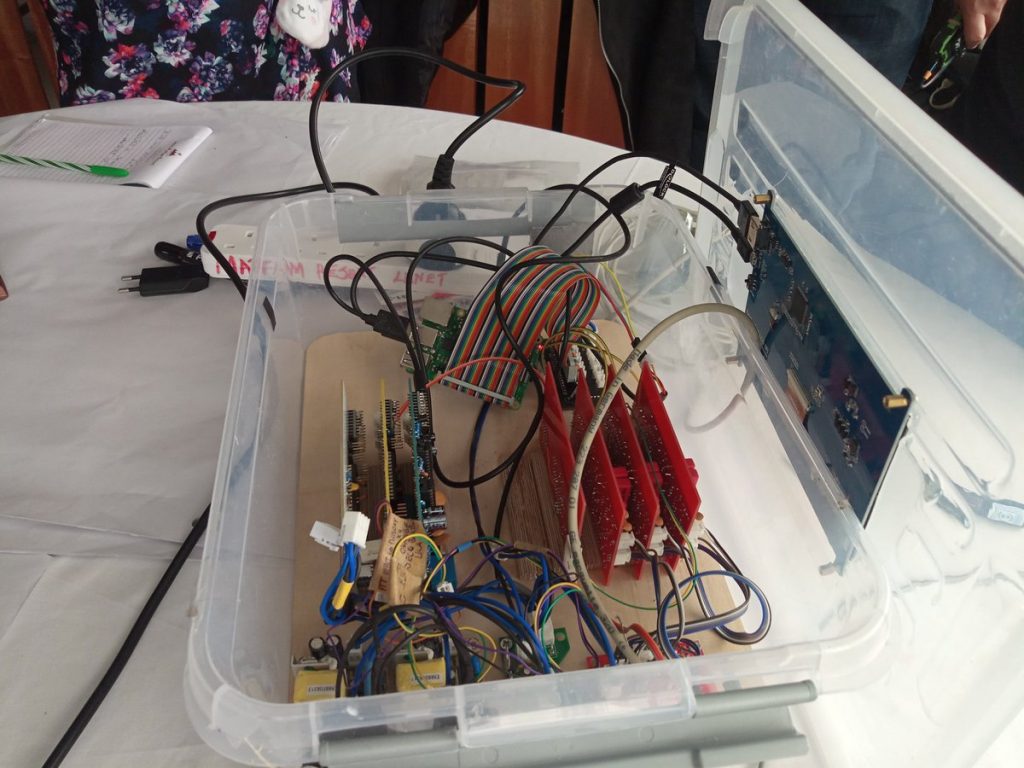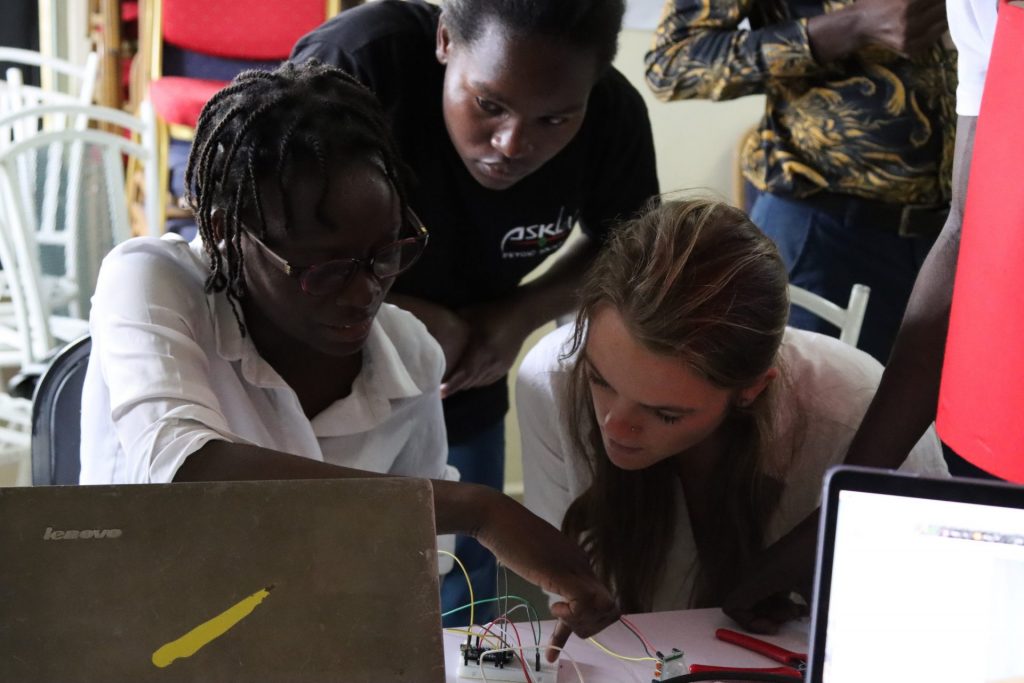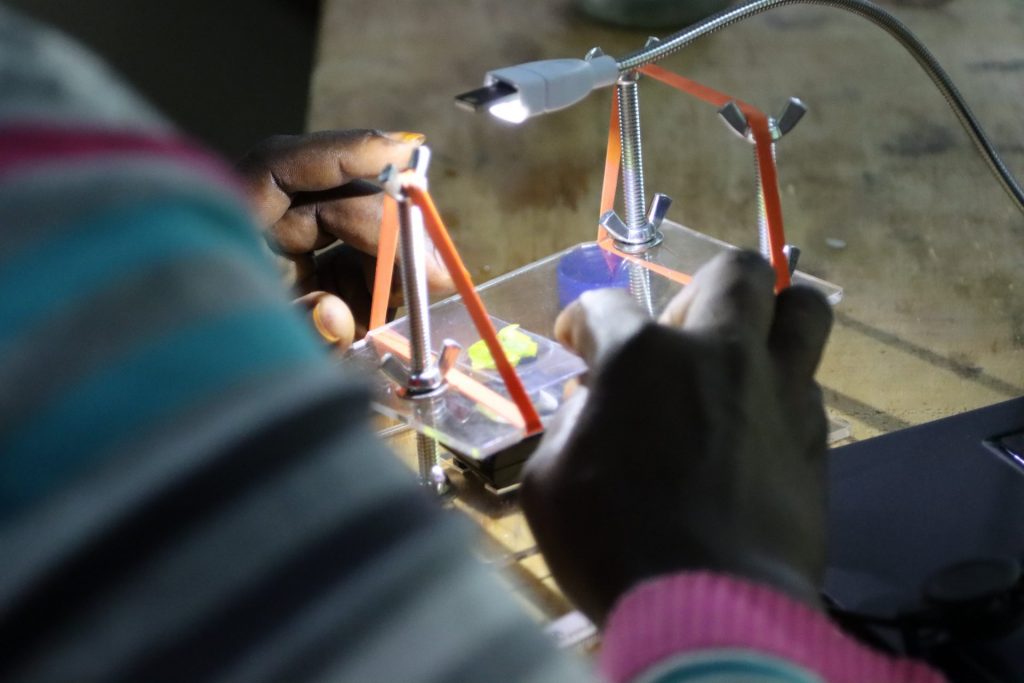At DOTS. The Impact Summit that took place in Nakuru, Kenya from December 5-7, we used the power of a gathering to co-create and kick off long-term projects that offer collaborative solutions to systemic problems in different localities. Here come some of the outcomes:
Data Sensitivity (with Tactical Tech)
Tactical Tech is an international NGO that engages with citizens and civil-society organisations to explore and mitigate the impacts of technology on society. One of their current flagship projects is The Glass Room: a multi-format interactive exhibition in several versions including the Community Edition. It has travelled the world to expose the data trails we leave and to increase public awareness and contribute to the dynamic education on this topic. In the Glass Room Community Edition, a pop-up exhibition explores how society is dealing with the growing dependency on data and technology.
Tactical Tech, GIG and the organizations represented at DOTS created a joint strategy to develop a Global Hub Edition of the Glassroom Experience based on localized content related to the startup community in innovation hubs. The
Guiding questions were:
- What role do tech hubs play as socio-political actors in their countries/regions?
- How can innovation hubs around the globe, with their respective challenges, engage their communities around the topic of data sensitivity?
- What are hubs already doing with regards to data privacy?
- What are the challenges in addressing data protection / sensitivity issues?
- How can hubs support entrepreneurs in thinking more critically about the use of data in their products, perhaps even market their awareness as a selling point?
- What would a Hub Edition of the Glassroom Experience look like?
A proposal for a project is being written, the authors will share it with the GIG Network and other interested parties during an extended review phase, in order to involve as many hubs as possible and create a shared global agenda.
Open Science for Peacebuilding
Open science offers the means to develop and build tools to help us overcome conflicts (e.g. water sensors in dry regions and seasons). Open science and data literacy equip us to critically think about the root causes of and potential solutions for conflicts. And finally, open science can serve as a vehicle of peacebuilding in communities through collaborative events such as hackathons or makeathons. After sharing their experiences, the participants developed a joint framework for open science and peacebuilding in action. On Day 2, the participants explored one area of open science through hands-on demos, making and peer-to-peer learning: DIYBio. Doing biotech research yourself means creating alternative, local and low-cost alternatives to biotech protocols as well as commercialized equipment. Obasegun Ayodele of Vilsquare / Nigeria and Nelly Flora Mengue Ango of Mboalab / Cameroon are hosting open DIYBio hackathons for peacebuilding and using low-cost incubators to locally produce Kossamtor yoghurt respectively. Other examples of open science in action were Public Lab‘s Community Microscopes and DIY soil moisture sensors.
Aside from a draft framework for the design of open science hackathons in a collaborative way that contribute to peacebuilding and solve local problems which often are the root causes for conflicts, the main outcome of this track is a collection of case studies of successful hackathons for peacebuilding which were conducted in Cameroon, Nigeria, Uganda, South Sudan, and Singapore. In collaboration with the GIG network, the AfricaOSH network, and the Wellbeing Economy Alliance, the participants of this track will continue working on the draft framework and create collaborative projects. Further, a PeaceHackCamp in Nigeria is being planned.
Sustainable Making
Globally, two major challenges face us and future generations: Climate change driven by unsustainable consumption, and large-scale under-employment particularly of urban youth.
The Do-It-Yourself ethos inherent in the maker movement builds cultures of reusing, up-cycling and recycling through hacking and building with available local resources. Not only reducing unsustainable resource use, but also empowering local innovators and marginalised groups, growing local economies and supporting climate change mitigation.
Innovations and movements such as e-waste innovations, 3D printing from recycled plastics, right-to-repair policies and distributed manufacturing initiatives such as Makernet, as well as business models for spaces like HUBinaBoX have been championed by GIG members and others. Together with designers, makers, DIY enthusiasts, hobbyists, entrepreneurs and policymakers, this track discussed, designed and answered questions around how to grow maker spaces and support making which promotes both environmental and economic stability for local communities, including the most vulnerable populations.
The participants formulated five Sustainable Making Principles, as well as a tool with which makers and makerspaces can self-assess how sustainable their makes are.
The participants further formed partnerships to promote Sustainable Making in 2020, e.g. through co-creating a Period Panty Makeathon, close collaboration with EngineeringGood and Careables, as well as using Open KnowHow as a framework for sharing.
Sustainable Making Principles
- Make things that make sense
Innovate products towards the SDGs. Make products/solutions that solve fundamental problems. - Share how you make
Set of guidelines that provides a framework for openly documenting everything about the making of a project - Integrate local knowledge
Build them within the community by working with local practices, materials and traditional resources. - Include ecosystem services
Aim to give back more than you take from the environment & include accounting practices that value the resources used. - Build to be self-sustaining/able
Design for the social, economic & ecological present and future.
Self-Assessment Tool
A detailed Blog Post from this track is being written and shall be published in late 2019 / early 2020.
Life Sensor Makeathon
Creating Open Source Hardware in Healthcare was the most hands-on making part at DOTS. With the Careables project – an EU Horizon2020 funded platform initiative to connect patients, healthcare professionals and makers, GIG supports global knowledge exchange on assistive tech and health tech. Cadus, a charitable and independent aid organisation, initiates innovative and sustainable projects focussing on need-based capacity building to help people help themselves. One of the latest inventions is the Life Sensor, a repairable patient monitoring device. A first prototype is currently being finished after two years of development.

At DOTS, GIG members who were new to the Life Sensor tested its documentation, shared local needs which the device might help solve, and checked its preparedness for such local use cases. There are gaps in the medical infrastructure in some places where DOTS participants operate, particularly refugee camps in Uganda and peri-urban and rural areas of South Sudan. For these areas, business models for using the LIfe Sensor were developed, which the respective organizations will use to develop pilot projects in 2020. Partnerships were established particularly amongst East African GIG members’ organizations, such as SwahiliBox in Mombasa / Kenya and Platform Africa in Arua / Uganda.
Curious? If you are interested in collaborating or further information please reach out to [email protected].



